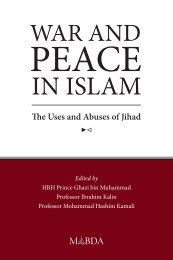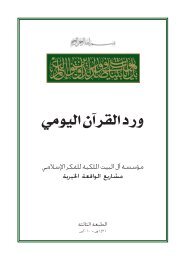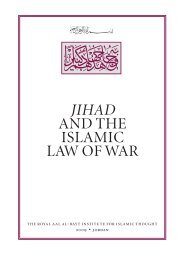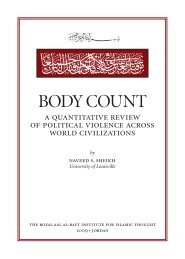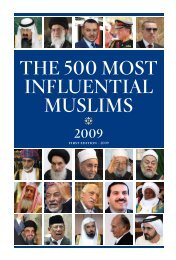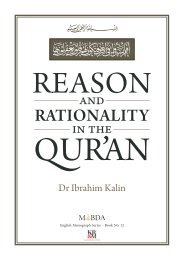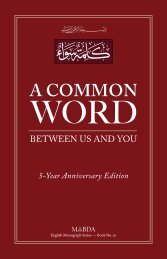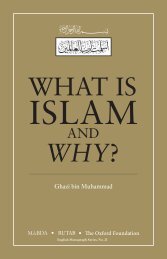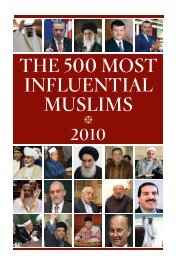Al-W¥^idÏ's Asb¥b al-Nuz‰l - The Royal Islamic Strategic Studies ...
Al-W¥^idÏ's Asb¥b al-Nuz‰l - The Royal Islamic Strategic Studies ...
Al-W¥^idÏ's Asb¥b al-Nuz‰l - The Royal Islamic Strategic Studies ...
Create successful ePaper yourself
Turn your PDF publications into a flip-book with our unique Google optimized e-Paper software.
Asbab <strong>al</strong>-Nuzul<br />
stipulate for myself that you defend me from that which you would defend yourselves’. <strong>The</strong>y said: ‘What<br />
do we get if we were to do this’ He said: ‘<strong>The</strong> Garden!’ they exclaimed: ‘This is a prosperous transaction;<br />
we will not revoke it nor will we resign it’. And so this verse was reve<strong>al</strong>ed”. 39<br />
(It is not for the Prophet, and those who believe, to pray for the forgiveness of<br />
idolaters…) [9:113-114].<br />
Abu ‘Abd <strong>Al</strong>lah Muhammad ibn ‘Abd <strong>Al</strong>lah <strong>al</strong>-Shirazi informed us> Muhammad ibn ‘Abd <strong>Al</strong>lah ibn<br />
Khamirawayh <strong>al</strong>-Harawi> Abu’l-Hasan ‘<strong>Al</strong>i ibn Muhammad <strong>al</strong>-Khuza‘i> Abu’l-Yaman> Shu‘ayb> <strong>al</strong>-<br />
Zuhri> Sa‘id ibn <strong>al</strong>-Musayyab> his father who said: “When Abu T<strong>al</strong>ib was about to die, the Prophet,<br />
<strong>Al</strong>lah bless him and give him peace, entered in on him while Abu Jahl and ‘Abd <strong>Al</strong>lah ibn Abi Umayyah<br />
were present. He said: ‘O uncle, say with me, there is no god but <strong>Al</strong>lah, so that I can plead with <strong>Al</strong>lah<br />
in your favour’. Abu Jahl and Ibn Abi Umayyah said: ‘O Abu T<strong>al</strong>ib, will you shun the religion of ‘Abd<br />
<strong>al</strong>-Mutt<strong>al</strong>ib’ And they kept t<strong>al</strong>king to him such that the last thing he uttered was: ‘I follow the religion<br />
of ‘Abd <strong>al</strong>-Mutt<strong>al</strong>ib’. <strong>The</strong> Prophet, <strong>Al</strong>lah bless him and give him peace, then said: ‘I will pray for your<br />
forgiveness as long as I am not forbidden from doing it’. This verse was then reve<strong>al</strong>ed (It is not for the<br />
Prophet, and those who believe, to pray for the forgiveness of idolaters even though they may be near of kin<br />
(to them) after it hath become clear that they are people of hell-fire)”. 40 This was narrated by Bukhari from<br />
Ishaq ibn Ibrahim> ‘Abd <strong>al</strong>-Razzaq> Ma‘mar, and <strong>al</strong>so by Muslim from Harm<strong>al</strong>ah> Ibn Wahb> Yunus;<br />
both Ma‘mar and Yunus related it from <strong>al</strong>-Zuhri.<br />
Abu Sa‘id ibn Abi ‘Amr <strong>al</strong>-Naysaburi informed us> <strong>al</strong>-Hasan ibn ‘<strong>Al</strong>i ibn Mu’ammil> ‘Amr ibn ‘Abd <strong>Al</strong>lah<br />
<strong>al</strong>-Basri> Muhammad ibn ‘Abd <strong>al</strong>-Wahhab> Ja‘far ibn ‘Awn> Musa ibn ‘Ubaydah> Muhammad ibn Ka‘b<br />
<strong>al</strong>-Qurazi who said: “I heard that when Abu T<strong>al</strong>ib fell ill to the illness that led to his death, the Quraysh<br />
said to him: ‘O Abu T<strong>al</strong>ib, send for your nephew to send you something to cure you from the Garden<br />
he mentions’. <strong>The</strong> emissary went to find the Messenger of <strong>Al</strong>lah, <strong>Al</strong>lah bless him and give him peace. He<br />
found him sitting with Abu Bakr. He said to him: ‘O Muhammad, your uncle says to you that he is old<br />
and weak and he wants you to send him some of the food and drink of the Garden you mention so that<br />
he regains he<strong>al</strong>th’. Abu Bakr replied: ‘<strong>Al</strong>lah, ex<strong>al</strong>ted is He, has made it forbidden for the unbelievers’. <strong>The</strong><br />
emissary went back to them and said: ‘I conveyed to Muhammad that with which you have sent me. He<br />
did not give me any answer, but Abu Bakr told me that <strong>Al</strong>lah has made the Garden forbidden for the<br />
unbelievers’. <strong>The</strong>y pressured Abu T<strong>al</strong>ib until he sent his own emissary to the Messenger, <strong>Al</strong>lah bless him<br />
and give him peace. He found him sitting in the same place and conveyed to him the same message. <strong>The</strong><br />
Messenger of <strong>Al</strong>lah, <strong>Al</strong>lah bless him and give him peace, said to him: ‘<strong>Al</strong>lah, ex<strong>al</strong>ted is He, has made the<br />
food and drink of the Garden forbidden for the unbelievers’. He then followed the emissary to the house<br />
of Abu T<strong>al</strong>ib. He found it full of men and so he said: ‘Could you leave me <strong>al</strong>one with my uncle’ <strong>The</strong>y replied:<br />
‘We will not leave you <strong>al</strong>one; you do not have a better right to him than us; if you are related to him,<br />
we are <strong>al</strong>so related to him!’ He sat close to his uncle and said: ‘May you be rewarded with good, O uncle;<br />
you have adopted me when I was sm<strong>al</strong>l and looked after me when I grew up. Help me with one sentence<br />
by means of which I will intercede to <strong>Al</strong>lah on your beh<strong>al</strong>f on the Day of Judgement’. Abu T<strong>al</strong>ib asked:<br />
‘And what is it, son of my brother’ He said: ‘Say: there is no god but <strong>Al</strong>lah, <strong>al</strong>one without any partners’.<br />
Abu T<strong>al</strong>ib said: ‘You have advised me; by <strong>Al</strong>lah, were it not for the fear that Quraysh will slander me,<br />
saying ‘Your uncle is afraid of death’, I would please you by saying it’. <strong>The</strong> people around him shouted:<br />
‘O Abu T<strong>al</strong>ib, you are the head of the primordi<strong>al</strong> religion (Hanifiyyah) 41 , the religion of the elders’. Abu<br />
T<strong>al</strong>ib said: ‘I do not want the women to relate that your uncle was scared at the moment of death’. <strong>The</strong><br />
Messenger of <strong>Al</strong>lah, <strong>Al</strong>lah bless him and give him peace, said: ‘I will keep praying for your forgiveness<br />
until my Lord stops me from doing so’. After Abu T<strong>al</strong>ib died, the Prophet kept praying for his forgiveness,<br />
and so the Muslims said: ‘What prevents us from praying for the forgiveness of our fathers and relatives<br />
39<br />
Cf. Durr, :294.<br />
40<br />
Tabari, :41; Qurtubi, :272; Durr, :299-300.<br />
41<br />
<strong>The</strong>re are many divergent opinions about who the Hunafa’ were, among both Muslim and non-Muslim scholars. Gener<strong>al</strong>ly<br />
speaking a Hanif is one who follows the origin<strong>al</strong> true religion. In the Qur’anic context, the hunafa’ refer to those who follow the<br />
religion of Abraham as opposed to the mushrikin, or idol worshippers. <strong>The</strong> term Hanif in this same context is <strong>al</strong>so equiv<strong>al</strong>ent to<br />
Muslim, i.e. one who submits to the will of God. Cf. the article Hanif in ei 2 .<br />
130



